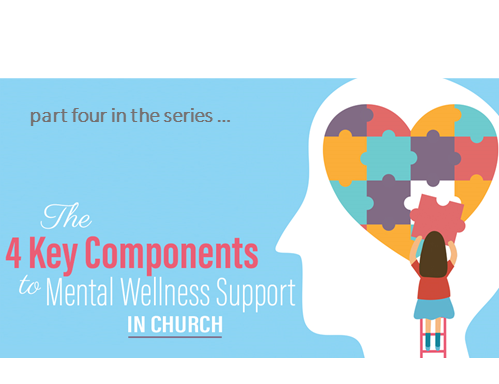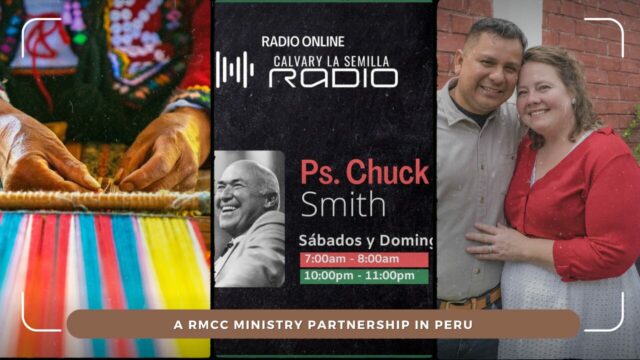
Taste and See God’s Goodness: The Jackson Willms Story
As I glanced out the front window and watched Jackson Willms and his care aide make their way up the...
Join us online at 9:00 am and 11:00 am Watch Online

Connecting with brothers and sisters in Christ is the third component of mental wellness support in the church. Unfortunately, we have a tendency as human beings to take things for granted. These current times are a great reminder to us to be thankful for our relationships and mindful about nurturing them.
Why Social Connection is Critical
During creation God said, “It is not good that man should be alone” (Gen 2:18) and then created Eve to be Adam’s helper. God also designed the family unit and gave us the powerful bond of friendship.
The need for others is literally etched into our DNA. Infants rely on social contact to help regulate their breathing and heart rate as they attune their biological rhythms to those around them. Even as adults, we still need the presence of others.
When we’re deprived of connection, even for just a few days, our stress hormones escalate. As discussed in our last post, stress hormones contribute to inflammation, which is not good for our body or our brain. (You can read part three in our series here.)
The Keys to True Connection
We’d all like to have “a friend who sticks closer than a brother” (Prov 18:24). However, satisfying relationships, in which we have trust and intimacy, don’t just happen. They take an investment of time and effort.
Consider these two keys to meaningful connection:
1. Quantity of interactions
2. Quality of interactions
Quantity: The Frequency of Interactions
It’s important to realize that we usually need a sufficient number of meetings with someone in order to develop a deeper connection. The myth of ‘quality time’ in parenting became popular several decades ago. However, it didn’t take into account that we cannot engineer quality interactions on demand.
This is why having regularly recurring meetings with the same people is so beneficial. (Hmmm… that description fits Bible studies, home fellowship groups and many other church activities!) Over time, we get to know one another and start sharing more details of our lives. Hopefully, with both truth and grace in the relationships, this leads to deeper connection.
Improving the Quality of our Interactions
Being comfortable with others and communicating effectively is not an ability we’re born with. There’s a reason we call them social skills. By definition, skills are competencies or abilities that are developed over time.
Yes, some people are more naturally extroverted and outgoing. However, even the most introverted, shy person can learn basic skills and start practicing them.
Why am I so convinced of this?
Personal experience. I used to be an extreme introvert, painfully shy and awkward meeting new people. This was definitely not a good thing when I was a family physician seeing patients all day long. My thinking was, “That’s just the way I am, and it’s the way I’ll always be.”
However, once the Lord put the burden on my heart to share with others about the healing He’d brought about in my life, He also led me to see that I could change. I ended up taking an in-depth 12-week Dale Carnegie Human Relations and Communications course. I also did two more complete sessions as a volunteer assistant. (OK, I needed a lot of practice!!)
What You Can Do Right Now
Beware of the ‘all-or-nothing thinking’ trap. I’ll talk more about harmful thought patterns in my next post, but until then just watch out for thoughts like, “Everything is different now” and “It’s just impossible to connect with all these restrictions.”
Certainly, connecting digitally or on the phone is not the same as in person. But it can still be meaningful.
You can also ask yourself, “How can I connect in person?” With the weather improving, meeting outdoors – sitting distanced around a firepit, for example – or joining a walking group are just two possibilities. (The walking group is a sneaky way for me to encourage you to get exercise as well as social connection.)
For more information on walking groups at RMCC:
Tuesdays (1-2 pm, ongoing, open to men and women). Contact Nichole Spelman-Porter at nspelmanporter@gmail.com
Saturdays (10:00 – 11:30 am, women only starting May 8th). Contact Megan Burwash at megan.burwash@gmail.com
In Conclusion
Don’t accept the enemy’s lies. He wants to isolate you and keep you from having rewarding relationships!
Are we not told that with God all things are possible (Matt 19:26)? He has helped me grow and change in ways I’d never dreamed of, and He will help you as well. (Even if, like me, you still may never be the life of the party.)
Sometimes it’s as simple as being more intentional and making the time to connect and fellowship. At other times, we need some help in overcoming harmful relating styles or social anxiety. I’d encourage you to check out the Vibrant Life Ministry section on RMCC’s website to see what is offered for mental wellness support in the church.
What one thing will you today to improve your social connectedness?
Feel free to contact me with any questions at drczeg@gmail.com.
Magda Czegledi has a unique perspective on mental health issues through her experience as a family doctor, a family member and as a patient. While experiencing a depression so severe she had to leave her family practice, she later recovered through a combination of her growing faith in Christ and basic lifestyle change. Currently, Magda works as a speaker, small group facilitator and peer support trainer.

As I glanced out the front window and watched Jackson Willms and his care aide make their way up the...

Several years ago, Pastor Blair Butterfield was at a pastors’ conference in Lima, Peru where he bumped into a man...

The world tells us we can do it all. Try hard enough, work enough hours, do all the right things...